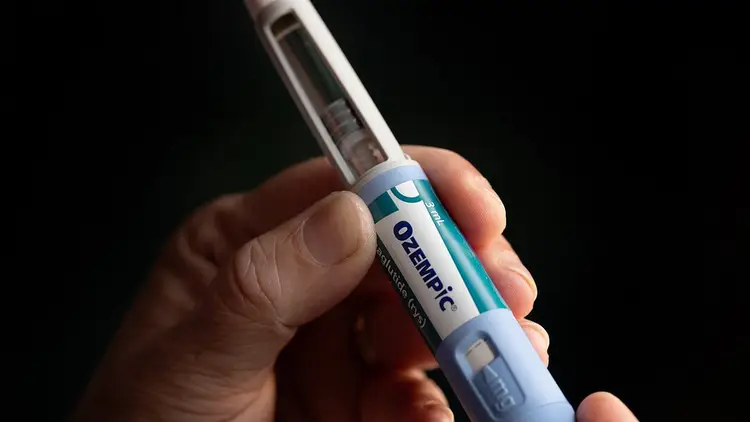Ozempic predicted to drop Americans' calorie intake by 70 TRILLION by 2030

In the next six years, Americans are projected to reduce their calorie intake by 70 trillion, largely due to the increased use of weight loss medications such as Ozempic and Wegovy.
By the close of 2030, it's anticipated that the typical adult in the US will consume between 100 to 800 fewer calories each year due to the appetite-reducing effects of these medications.
The analysis by Impact Analytics indicates that this will lead to a total yearly decrease of around 10 trillion to 68 trillion calories by the year 2030.
The study revealed that after weight loss medications were authorized in 2021, there has been a significant increase in the sales of fresh fruits and vegetables in the United States, while the consumption of junk food has decreased.
Last year, the stock prices of Kraft Heinz, known for Jell-O, Kellanova, which produces Pringles, and PepsiCo, the parent company of Frito-Lay, all reached historic lows. This trend is being referred to as the 'Ozempic effect.'
Approximately six percent of adults in the United States, which amounts to about 18 million people, are using medications that imitate the hormone that signals the brain to feel full. Some of these medications are Ozempic, Wegovy, Zepbound, and Mounjaro.
Approximately 12 percent of adults in the U.S. have used these medications at some point since they were introduced, and about six percent, or around 18 million people, are currently using them.
Thanks to the hormones that trigger feelings of fullness, individuals using these medications consume significantly less food compared to when they’re not using them. This results in smaller meal portions and reduced snacking.
According to the Impact Analytics report, it's estimated that in 2024, individuals will consume an average of about 3,600 calories each day.
The organization thinks that this figure might drop to 2,800 calories by the year 2030, marking the lowest level since the 1960s.
The report indicates that fresh produce sales have risen, showing a 12.4 percent growth in fresh fruit sales and a 9.2 percent rise in vegetable sales since 2021.
Morgan Stanley, the investment bank, forecasts that by 2035, there will be a four percent decline in the number of individuals consuming sodas, alcoholic beverages, and salty snacks. This trend will compel manufacturers to either adjust their product formulas or face the possibility of being pushed out of the market.
Prashant Agrawal, the CEO of Impact Analytics, shared with USA TODAY that there is a shift happening from sugary and processed foods towards healthier options.
"GLP plays a role in this issue. Additionally, many individuals are increasingly concerned about the consumption of ultra-processed foods."
The writers of the report stated that as more individuals embrace healthier diets and turn to GLP-1 medications, the need for high-calorie, processed foods is likely to see a considerable decline by the year 2030.
Sales of sugary treats, fizzy drinks, fast food, frozen dinners, and other high-calorie, low-nutrition items are probably going to drop.
By 2030, we might see a major decrease in calorie consumption among adults, largely due to the growing use of weight loss drugs that have become increasingly popular.
A study carried out by Morgan Stanley revealed that 73 percent of individuals reduced their consumption of sweet treats, such as sugary candies, chocolates, and certain baked goods.
Key companies in the fast food sector, including McDonald's, Burger King, and Yum Brands—parent company of KFC and Taco Bell—might experience a decline in demand.
In a statement to Bloomberg last year, the CEO of Kellanova, the international snacking firm behind popular brands such as Cheez-It, Pringles, and Rice Krispies Treats, emphasized that they will examine any factors that could affect their operations. He added that they'll analyze these situations and take steps to reduce any potential risks if needed.
The following day, Barclays, an investment firm, forecasted how the introduction of these drugs would affect various companies, including Pepsi Co., known for its sodas, as well as snack brands like Cheetos and Doritos, along with McDonald's and Altria Group Inc., the company that produces cigarettes.
The company recommended that these businesses secure insurance to safeguard themselves from possible financial setbacks. Analysts have pointed out that the effects of GLP-1 medications could lead to disturbances in various sectors.



































































